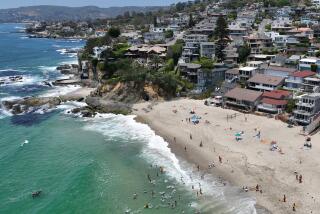Orange County Voices : COMMENTARY ON BEACH CLOSURES : Balancing Right of Access and Need for Safety a Local Dilemma : Decisions about curfews are best left to the communities that are affected and not the state Coastal Commission.
- Share via
The California Coastal Commission recently became alarmed when, to protect the public safety, both state and local agencies began the late evening closure of beaches and beach parking lots.
In some instances, closures were brought about because angry residents were annoyed by the traffic and noise created by beach visitors. In other instances, closures were primarily made for public safety reasons or a lack of public funds to patrol beaches after dark.
Some have asked why the Coastal Commission cares if a beach is closed during the late evening hours. In fact, many law-abiding citizens use the beach at all hours of the evening for fishing, swimming and evening walks. It is a citizen’s constitutional right to do so and this right should only be curtailed if there is a compelling reason.
Sadly, our urban communities face enormous problems involving criminal acts of violence, vandalism and theft. Many coastal communities find these problems spilling over to the beaches and therein lies the delicate issue of balancing the right of public access with the need for public safety.
As a democratic people, we should not trample on our fundamental freedoms and the rights of honest citizens to enjoy our beach merely to get at the gangs and violence.
But we should also not deny the greater threat that violence and gangs pose to our society. It is this threat that overwhelmingly concerns most people today.
While the Coastal Commission must continue to objectively develop policies which protect our beaches, coastal agriculture, wetlands and the public’s right of access to the coastline, it must also be mindful of the public’s genuine concern for public safety.
To combat the rise of urban crime and violence, local and state agencies must have all the tools necessary to cope with these increased threats, not just in temporary or emergency situations but also for the long term.
Local agencies responsible for law enforcement, marine safety and beach maintenance must be given the authority to set hours of operation based on the agency’s logistical and financial situation.
In some cases, it may be necessary to distinguish between the closure of a sandy public beach and closing related facilities such as parking lots, access ways, piers and boat ramps. In other instances, closing a beach may be the wrong response to a public safety problem. That was the case in San Diego, where the city’s request for early closure of some beach parking lots was opposed by law enforcement officials who were concerned that even greater problems would result among young people with fewer places to go.
Historically, the Coastal Commission has been responsible for setting policy regarding development within the coastal zone. The issue before the Coastal Commission is now whether such public safety closures constitute “development.”
The commission is also trying to decide whether it should hold public hearings and determine closure policies or whether that responsibility should be left to local agencies.
In my view, public safety closures in no way constitute “development” by any stretch of imagination.
Further, each coastal community has unique public safety problems which need to be resolved on a case-by-case basis by those most closely affected.
The public’s rights in these matters can be protected if local agencies adhere to Coastal Commission policy requiring local agencies to hold a public hearing to determine when such closure hours are necessary for public safety.
It is a shame that some of our coastal cities find themselves in a position where they must consider beach curfews to protect the public safety. Beaches are one of our most beautiful natural resources.
From my point of view, sitting on both sides of the issue as mayor of Huntington Beach and as a member of the Coastal Commission, I am personally saddened by the limited choice presented to us. However, I am unwilling to turn over our beaches to gangs and violence. The decision is best left to the communities that are affected. I hope that other members of the Coastal Commission will agree with me on this.
More to Read
Sign up for Essential California
The most important California stories and recommendations in your inbox every morning.
You may occasionally receive promotional content from the Los Angeles Times.













